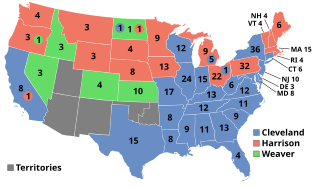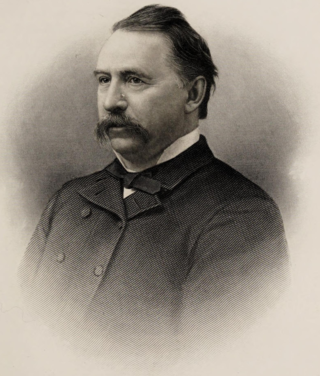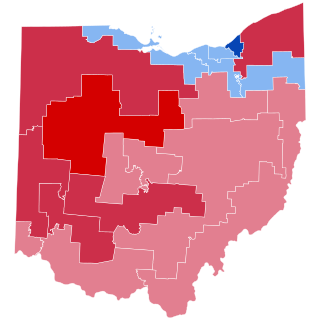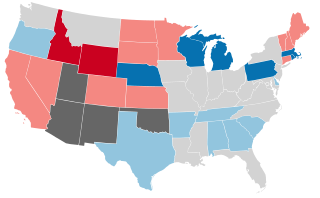
Presidential elections were held in the United States on November 8, 1892. In the fourth rematch in American history, the Democratic nominee, former president Grover Cleveland, defeated the incumbent Republican President Benjamin Harrison. Cleveland's victory made him the first president in American history to be elected to a non-consecutive second term, a feat not repeated until Donald Trump was elected in 2024. The 1892 election saw the incumbent White House party defeated in three consecutive elections, which did not occur again until 2024.

The 1978 United States Senate elections were held on November 7, in the middle of Democratic President Jimmy Carter's term. The 33 seats of Class 2 were contested in regular elections. Special elections were also held to fill vacancies.

The 1972 United States Senate elections were held on November 7, with the 33 seats of Class 2 contested in regular elections. They coincided with the landslide re-election of Republican President Richard Nixon. Despite Nixon's landslide victory, Democrats increased their majority by two seats. The Democrats picked up open seats in Kentucky and South Dakota, and defeated four incumbent senators: Gordon Allott of Colorado, J. Caleb Boggs of Delaware, Jack Miller of Iowa, and Margaret Chase Smith of Maine. The Republicans picked up open seats in New Mexico, North Carolina, and Oklahoma, and defeated one incumbent, William B. Spong Jr. of Virginia.

The 1964 United States Senate elections were held on November 3. The 33 seats of Class 1 were contested in regular elections. Special elections were also held to fill vacancies. They coincided with the election of President Lyndon B. Johnson by an overwhelming majority, to a full term. His Democratic Party picked up a net two seats from the Republicans. As of 2023, this was the last time either party has had a two-thirds majority in the Senate, which allowed the Senate Democrats to override a veto, propose constitutional amendments, or convict and expel certain officials without any votes from Senate Republicans. However, internal divisions would have prevented the Democrats from having done so. The Senate election cycle coincided with Democratic gains in the House in the same year.

The 1960 United States Senate elections coincided with the election of John F. Kennedy as president on November 8, 1960. The 33 seats of Class 2 were contested in regular elections. A special election was also held on June 28, 1960, for a mid-term vacancy in North Dakota where Democrats flipped a seat to expand their majority to 66–34. As Majority Leader Lyndon Johnson was elected Vice President, Mike Mansfield became the new majority leader.

The 1890 United States House of Representatives elections were held for the most part on November 4, 1890, with five states holding theirs early in between June and October. They occurred in the middle of President Benjamin Harrison's term. Elections were held for 332 seats of the United States House of Representatives, representing 44 states, to serve in the 52nd United States Congress. Special elections were also held throughout the year.

The 1888 United States House of Representatives elections were held for the most part on November 6, 1888, with three states holding theirs early between June and September. They occurred at the same time as the election of President Benjamin Harrison. Elections were initially held for 325 seats of the United States House of Representatives, representing 38 states, to serve in the 51st United States Congress. Six new states would later join the union and increase the House to 332 seats. Special elections were also held throughout the year.

John Winans was an American lawyer and Democratic politician from Janesville, Wisconsin. He served one term in the U.S. House of Representatives, representing Wisconsin's 1st congressional district during the 48th Congress (1883–1885). He then served as the 25th mayor of Janesville, from 1885 to 1889. Earlier, he represented Janesville and central Rock County for six years in Wisconsin State Assembly.

The 2010 congressional elections in Ohio were held on November 2, 2010. Ohio had eighteen seats in the United States House of Representatives, and all eighteen incumbent Representatives were seeking re-election in 2010. The elections were held on the same day as many other Ohio elections, and the same day as House of Representatives elections in other states.

The 1978 Massachusetts gubernatorial election was held on November 7, 1978. Former Massachusetts Port Authority executive director Edward J. King was elected to a four-year term, from January 4, 1979, until January 6, 1983. King won the Democratic nomination by defeating incumbent governor of Massachusetts Michael Dukakis in the Democratic primary.

The 1862–63 United States Senate elections were held on various dates in various states, occurring during the American Civil War. As these U.S. Senate elections were prior to the ratification of the Seventeenth Amendment in 1913, senators were chosen by state legislatures. Senators were elected over a wide range of time throughout 1862 and 1863, and a seat may have been filled months late or remained vacant due to legislative deadlock. In these elections, terms were up for the senators in Class 1.

The 1906 Pennsylvania gubernatorial election occurred on November 6, 1906. Incumbent Republican governor Samuel W. Pennypacker was not a candidate for re-election.

The 1936 United States Senate election in Michigan was held on November 3, 1936. Incumbent Republican U.S. Senator James J. Couzens ran for re-election to a third term in office, but was defeated in the Republican primary by Governor Wilber Brucker. Brucker was defeated in the general election by Democratic U.S. Representative Prentiss M. Brown, becoming the first Democrat to win this seat since 1853.

The 1968 United States Senate election in California was held on November 5, 1968.

The 1916 Michigan gubernatorial election was held on November 7, 1916. Republican nominee Albert Sleeper defeated Democratic nominee Edwin F. Sweet with 55.83% of the vote.

The 1904 Illinois gubernatorial election was held on November 8, 1904.
Events from the year 1887 in Michigan.

James Munroe Turner was a Michigan politician.

United States gubernatorial elections were held in 1890, in 27 states, concurrent with the House and Senate elections, on November 4, 1890.

The 1914 South Dakota gubernatorial election was held on November 3, 1914. Despite a close election in 1912, incumbent Republican governor Frank M. Byrne defeated Democratic nominee James W. McCarter, an Edmunds County Judge, with 50.07% of the vote. Coincidently, Bryne's Democratic opponent in 1912, Edwin S. Johnson, was elected the same year to represent South Dakota in the United States Senate.























